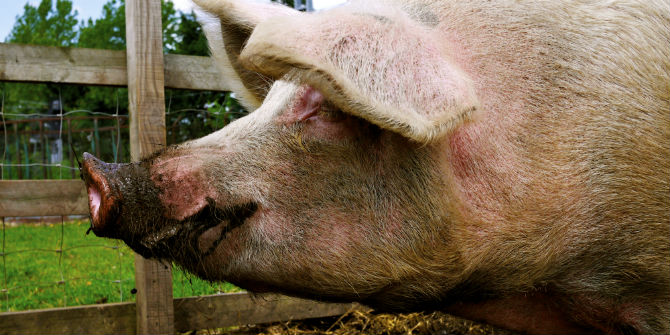 The effect of Brexit on unfair trading practices (UTPs) has been largely overlooked, yet it could be very significant – especially in agriculture. Tom Verdonk (KU Leuven) looks at whether the regulations could diverge and what impact that would have.
The effect of Brexit on unfair trading practices (UTPs) has been largely overlooked, yet it could be very significant – especially in agriculture. Tom Verdonk (KU Leuven) looks at whether the regulations could diverge and what impact that would have.
With the UK’s imminent withdrawal from the EU, the EU’s motto “United in diversity” has clearly taken a hit. While the motto is generally used to refer to European cultural diversity, it could equally apply to some legal domains. One legal area in which EU Member States have shown to be united in diversity is the domain of so-called laws on unfair trading practices between businesses (UTPs), which refers to a wide variety of business-to-business practices that deviate from good commercial conduct and are contrary to good faith and fair dealing.

UTPs tend to occur in vertical relationships (i.e. between a supplier and a buyer) characterised by an inequality of bargaining power. Similar to abuses of dominance, UTPs are often imposed unilaterally by a larger undertaking on a smaller one, though a firm does not have to be dominant in the competition law sense. The asymmetrical relationship between two undertakings itself is seen as a facilitator for the imposition of harmful practices at the expense of the smaller firm.
Consequently, almost all Member States have taken legislative and/or regulatory initiatives addressing UTPs. Without rules to tackle UTPs, they fear UTPs will impede the functioning of markets, as they can result in the misallocation of resources and (disproportional) exclusionary and exploitative conduct, at the expense of SMEs and, ultimately, consumers. But approaches of Member States are far from uniform. The beginning of the end of this divergence may, however, soon commence, as the Commission recently proposed legislation in this area. Interestingly, the UK Government was for a long time one of the Commission’s main critics, arguing against any attempt to harmonise rules on UTPs. Among other reasons, it did not recognize the added value of EU rules on top of its own system.
Compared to other fields of law that deal with the protection of markets and their participants, the impact of Brexit on the regulation of UTPs has been virtually overlooked, arguably due to the absence of common rules on UTPs (as of yet). Nevertheless, this field should not be ignored, as the sector-specific scope of the draft EU legislation on UTPs could have profound effects on some important UK and EU markets in the post-Brexit era. Therefore, this article explores the development of regulation of UTPs in the EU and the UK, highlights interesting elements from these systems, and shares some thoughts on how Brexit may impact the future development of this legal domain.
Developments in the European Union
Apart from the Late Payments Directive and the Directive on misleading and comparative advertising, there are no EU rules on UTPs between businesses. The lack of common rules is surprising in itself, because EU law has a prominent, if not leading, role in many adjacent areas of law and policy, such as competition law, consumer law, and agricultural policy. Despite the absence of common rules on UTPs, almost all Member States have implemented laws, regulations and administrative provisions to specifically address UTPs. General (contract) law is not seen as an adequate solution, since smaller parties like SMEs may be reluctant in seeking redress before civil courts for fear of retaliations (known as the “fear factor”).
Approaches of Member States come in all shapes and forms, but can essentially be divided into two groups. In the first group Member States have stretched the scope of competition law beyond the boundaries of the abuse of dominance prohibition, as laid down in Article 102 TFEU. As Member States are not precluded under Regulation 1/2003 from implementing stricter national competition laws with regard to abuses of dominance, some have introduced the concepts of abuses of superior bargaining power or economic dependence (e.g. France and Germany). In the second group (representing the vast majority of Member States), on the other hand, Member States have chosen to implement legislation outside the scope of competition law. These rules aim to govern contractual relations between suppliers and buyers, sometimes specifically addressing the food supply chain. Typically, rules on UTPs in the area of business-to-consumer protection have been extended to business-to-business transactions. In addition to the above approaches, many self-regulatory mechanisms, again often with a focus on the food supply chain, have been launched, such as the EU-wide Supply Chain Initiative.
In response to the fragmentation within the EU in the regulation of UTPs and in contract law in general, harmonisation attempts have been made but have also proven to be very difficult. An exemplary project from recent times in that regard was the rejected Common European Sales Law, which aimed to introduce a single set of contract law rules that would stand as an alternative to national contract law of Member States in both business-to-consumer and business-to-business transactions.
However, recent initiatives could turn the tide. In April 2018 the European Commission proposed two pieces of legislation that aim to tackle UTPs between businesses: a proposal against UTPs in the food supply chain and a regulation to ensure fairness of platform-to-business trading practices in the online platform economy. Particularly, the first initiative sparked discussion, because it would – if adopted – introduce a minimum level of protection for suppliers active in the food supply chain against UTPs of buyers across the EU, prohibit a number of UTPs (of which some, only if not agreed in clear and unambiguous terms), and have each Member State designate a competent enforcement authority with the power to apply fines.
Another interesting aspect of the proposal is its legal basis, which was found in one of the key objectives of the EU’s Common Agricultural Policy (i.e. “to ensure a fair standard of living for the agricultural community”). As a result, agricultural policy and EU regulation of UTPs have become closely intertwined. Currently, both proposals have been submitted to the European Parliament and the Council, and are still under debate. If adopted, they would introduce EU rules on UTPs, albeit with a sector-specific and limited substantive scope.
Developments in the United Kingdom
Within the debate on EU rules on UTPs, the UK Government has always been a fierce opponent of any European intervention. Some of its reasons against harmonisation were of a more general nature and included its scepticism towards the incorporation of concepts like “good faith” and “fair dealing” into the UK’s common law system (and the legal uncertainty they, accordingly, could create within the system), the inadequacy of contract law in dealing with abuses of economic dependence, and the risks associated with interfering in the business-to-business freedom of contracts, particularly the increased likelihood of overprotection. Based on these arguments, the UK Government expressed its support for a sector-by-sector approach through national initiatives. That way, certain market failures could be targeted specifically, allowing interventions to be beneficial or at least neutral in their impact, in both the short and long term.
Despite its sector-specific focus and minimum harmonisation character, the UK Government also expressed concerns over the Commission’s draft Directive on UTPs in the food supply chain. Its main concerns were the lack of flexibility for Member States and the costs of the increased remit of a regulatory authority. Instead of harmonising the rules on UTPs, the UK Government considered Member States themselves to be in the most appropriate position to legislate. This allows them to take into account the specific, domestic market conditions, as the UK does, according to the Minister for Agriculture, Fisheries and Food, within its already existing system addressing UTPs.
Currently, the UK does not have general (statutory) rules on UTPs, but it does have a system to tackle UTPs in the UK groceries supply chain. The Groceries Code Adjudicator (GCA) monitors and enforces compliance with the Groceries Supply Code of Practice (GSCOP), which aims to ensure fair and lawful treatment of direct suppliers by the UK’s ten largest supermarkets. The GSCOP applies only to supermarkets with a turnover in sales of groceries in the UK exceeding £1billion, which currently are: Aldi, Asda, Co-operative, Iceland, Lidl, Marks & Spencer, Morrisons, Sainsbury’s, Tesco, and Waitrose. Under the GSCOP these supermarkets must comply with a variety of obligations when dealing with their suppliers, including the use of written contracts, and refrainment from retrospective supply arrangements and pay delays. If a supermarket does not comply with the GSCOP, a supplier is able to involve the GCA. The GCA then has the power to arbitrate, investigate and fine a supermarket. In February of this year, the UK Government decided not to extend the remit of the GCA following a consultation. Although the consultation identified UTPs in the UK groceries supply chain, the Government concluded that “there is no clear evidence of systematic widespread market failures.”
Similar to the EU, regulation of UTPs in the UK cannot be considered in isolation from agricultural policy. While UK’s withdrawal from the EU will also place it outside the CAP, a link between UK agricultural policy and regulation of UTPs will probably continue to exist. A new Agriculture Bill was introduced by the Government into Parliament in September of this year. Among other provisions, the draft bill includes a provision that gives the Government the power to make regulations “for the purpose of promoting fair contractual dealing by the first purchasers of agricultural products (…) in relation to contracts they make for the purchase of agricultural products from producers.”
Post-Brexit prospects
Brexit may serve as turning point for EU regulation of UTPs, as proponents of harmonisation of laws on UTPs lose a critical Member State. To a great extent, this will also depend on the success of the proposed Directive on UTPs in the food supply chain. If adopted and positively evaluated in the (near) future, the Directive could reinvigorate calls for further integration and perhaps even for general EU laws on UTPs between businesses, similar to the provisions and instruments of EU consumer and competition law. Ironically, despite its opposition against EU laws on UTPs, the UK’s withdrawal from the EU will not provide its government an opportunity to shirk from participating in debates on the desirability of laws on UTPs. In fact, despite Brexit, laws on UTPs could affect the UK in a number of ways.
Firstly, following Brexit, UK-based businesses conducting business with EU-based businesses would still have to comply with the applicable laws on UTPs in Member States in some cases. If the draft EU legislation were to be adopted, UK-based buyers active in the food supply chain buying from EU-based suppliers would have to comply with the implemented obligations of the draft Directive, and UK-based digital firms targeting the EU market would have to comply with the terms of the draft Regulation. Given the great uncertainty regarding the Brexit scenario(s), it is difficult to assess how Brexit could impact laws on UTPs during the transition period. According to the current draft EU27/UK Withdrawal Agreement, the UK would remain bound by all existing and new EU regulations throughout a transition period, which is currently scheduled to end on 31 December 2020. Hence, if the Directive and/or the Regulation were to be adopted before or during the transition period, the UK would still be bound by the adopted legislation on UTPs for a while. Accordingly, on the basis of that scenario it is unlikely that divergence in laws on UTPs between the UK and the EU27 will arise in the short term.
However, the impact of Brexit on regulation of UTPs in the long term is less straightforward. Divergence in legislation could eventually arise if the EU27 would decide to further integrate laws on UTPs. If the laws on UTPs were to be adopted and positively evaluated a few years after implementation, this could pave the way for the expansion of the scope of the rules or the introduction of similar rules in other supply chains. In those instances, it remains to be seen whether the UK will follow suit. Also, the UK itself may decide to diverge from the EU’s approach to UTPs, because Brexit provides the UK an opportunity to tailor its legislation and regulation to the specific conditions of its domestic markets, such as the agricultural market. Given the close relationship between regulation of UTPs and agricultural policy, divergence between EU and UK agricultural policies may play a significant role in this as well.
On the other hand, it remains to be seen whether the EU27 will actually continue to harmonise rules on UTPs. The path that eventually led to the draft Directive was scattered with obstacles, hardly surprising after various failed attempts to harmonise European private law. Reaching consensus on the way forward will – without the UK – not be a walk in the park all of a sudden for the remaining Member States. Furthermore, in response to the undesirability of any divergence between the UK’s and EU’s approach to UTPs, (some) convergence or coordination may be deemed necessary. The desirability of cooperation in this area may specifically be relevant in the agricultural sector, given the significant cross-border agricultural trade between the UK and some Member States of the EU27. After all, the UK is currently far from self-sufficient in agricultural production and the EU is the UK’s single largest trading partner in agri-food products, accounting for 60% of exports and 70% of imports, as also recognised in a House of Commons report on Brexit and its impact on the UK’s food and farming industry.
Either way, it is clear to parties on both sides of the Channel and the North Sea that discussions on UTPs legislation are not done yet. In the EU, current discussions on the draft UTPs legislation in the European Parliament and the Council reveal that there seems to be general support for the draft Directive (though some call for an extension of its scope). Similarly, the consultation on the GCA and the new Agriculture Bill indicate strong support for extension of rules on UTPs in the UK from a variety of stakeholders, including agricultural trade associations. Therefore, it is more likely than not that following Brexit debates on the desirability and scope of laws on UTPs will remain on the political agendas of the UK and the EU27.
This post represents the views of the author and not those of the Brexit blog, nor the LSE. It first appeared at European Futures.
Tom Verdonk is a PhD candidate in Law at the Institute for Consumer, Competition & Market at KU Leuven. His research focuses on the economic regulation of agricultural inputs markets, taking into account competition laws, intellectual property and agricultural policy.







1 Comments